Activity Level: High
Hypoallergenic: No
Social Ability: Selectively Social
Skills: Obedience, Service, Herding
Intelligence: Above Average
Ideal Climate: Temperate
German Shepherd Dogs (GSD) have been a favorite canine breed for decades, herding livestock and helping people in a variety of service roles. These caring dogs enjoy ample play time, engaging toys, and plenty of affection from their human best friends.
Breed Overview
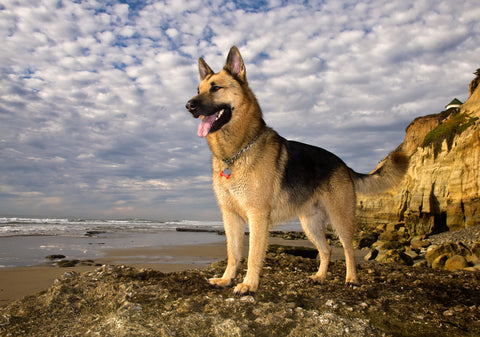 Origin: Named Deutscher Schäferhund in their mother language, German Shepherds originated from Germany in the 1890s, born into an era of efforts to standardize dog breeds in order to delegate canine tasks more efficiently. As industrialization overtook the country, and the continent for that matter, the number of livestock predators decreased, and the need for sheepdogs declined. At the same time, sheepdogs were increasingly recognized for their intelligence and skills, leading breeders toward developing more vigilant canines for more serious roles.
Origin: Named Deutscher Schäferhund in their mother language, German Shepherds originated from Germany in the 1890s, born into an era of efforts to standardize dog breeds in order to delegate canine tasks more efficiently. As industrialization overtook the country, and the continent for that matter, the number of livestock predators decreased, and the need for sheepdogs declined. At the same time, sheepdogs were increasingly recognized for their intelligence and skills, leading breeders toward developing more vigilant canines for more serious roles.
In 1899, German cavalry officer and former student of the Berlin Veterinary College Max von Stephanitz purchased a curious sheepdog at a show, changed its name to Hektor, and founded the Verein für Deutsche Schäferhunde (Society for German Shepherd Dogs). Hektor was a simple herding canine bred from hearty stock, but von Stephanitz saw potential in this uniqueness. This same year, Hektor would be declared the first German Shepherd dog, setting the standard for the breed as the ‘perfect working dog.’
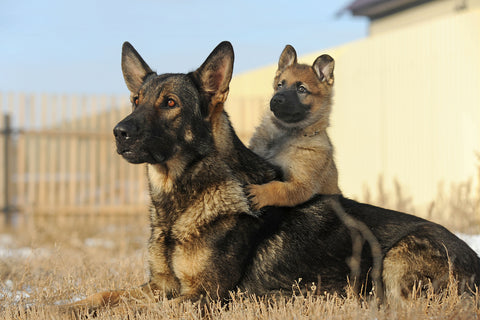 History: Bred for herding, German Shepherds spent decades as farm dogs, herding sheep and guarding livestock. As industrialization took over large portions of agricultural space across Europe in the twentieth century, there became fewer predators and therefore a decreased need for livestock guard dogs. Luckily, these canines had more to offer; their intelligence and obedience made them the perfect candidates for military use.
History: Bred for herding, German Shepherds spent decades as farm dogs, herding sheep and guarding livestock. As industrialization took over large portions of agricultural space across Europe in the twentieth century, there became fewer predators and therefore a decreased need for livestock guard dogs. Luckily, these canines had more to offer; their intelligence and obedience made them the perfect candidates for military use.
Tensions rose as the western world entered the twentieth century, and many canine breeds were utilized in warfare and combat in World War I. German Shepherds were then the obvious choice for the rising Nazi party in the 1930s, and slowly the breed became associated with the fascist group and their militia. In Germany at the time, the breed was referred to as Urhunde, meaning ‘primal dog’ for their wolf-like stature and intimidating presence that drew military officials to them in the first place. After the war, many classically German breeds including GSD and Dachshund suffered from negative associations and dropped in popularity. In fact, in England GSDs are called Alsatians, owing to post-war anti-German rhetoric.
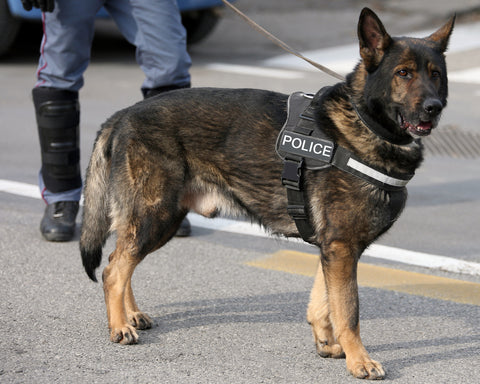
They slowly rose back to popularity over the years, thanks to famous dogs such as Rin-Tin-Tin and Strongheart who helped shape the public idea of this breed as a helpful, skillful pet. In the following decades and to this day, German Shepherds are one of the top dog breeds in the US and many other countries, where they can be found as family companions, on farms, and in service positions such as police dogs.
K9-Unit dogs are specially trained in obedience, and the GSD’s natural talent for service makes them an outstanding candidate for police use. Generally healthy, intelligent, and loyal, a GSD feels right at home at the side of their owner or handler where they can show off their skills and be rewarded. Currently, countless organizations such as the American German Shepherd Dog Charitable Foundation conduct health research, foster and home GSDs, and share validated information on the breed’s needs. Many of these foundations also support American veterans, such as Pets for Patriots’ vision of helping veterans adopt pets with their German Shepherd Rescue program and K9s for Warriors’ mission to place retired military and police dogs with veterans in need.
Breed Attributes
 Temperament: GSDs have a gentle and loving nature toward humans, children, and small animals, owing to their instinctual guardianship traits. This same trait may make a German Shepherd defensive toward other dogs or larger animals, but obedience training can help your dog stay calm around anyone. The breed standard includes a specific aloofness, which may seem unfriendly but is actually another instinct at work; as a guardian canine, GSDs often see themselves as superior to surrounding animals in a protective manner more so than standoffish.
Temperament: GSDs have a gentle and loving nature toward humans, children, and small animals, owing to their instinctual guardianship traits. This same trait may make a German Shepherd defensive toward other dogs or larger animals, but obedience training can help your dog stay calm around anyone. The breed standard includes a specific aloofness, which may seem unfriendly but is actually another instinct at work; as a guardian canine, GSDs often see themselves as superior to surrounding animals in a protective manner more so than standoffish.
Personality: While every pup is different, German Shepherds are well-known for their distant yet friendly demeanor toward humans of all ages. They may act apprehensive around other dogs, but this instinct helps them keep themselves and their pack safe. Once they feel comfortable in their environment, the average GSD may thoroughly enjoy cuddles and affection from their family. Every dog needs a healthy amount of play and recreation to maintain a calm demeanor and keep their mind active. With ample exercise, training, and mental stimulation, your GSD can thrive and feel comfortable at home and out in the world.
Ideal Owner: You! German Shepherds are outstanding companions, eager to help and please their owners. Whether your family is big or small, with members of any species, a GSD will bring joy and excitement to your home.
Fur Care
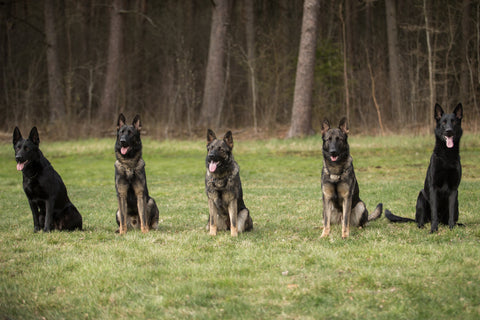
Grooming: German Shepherd fur is easy to care for; brushing the coat every few days is a great way to help manage shedding and keep fur free from debris. Their medium-length fur is dense, with a close outer coat and soft undercoat, needing only occasional baths. These outdoorsy canines can often accumulate odors in their fur, and a gentle hypoallergenic shampoo can help keep their coat fresh and smelling clean after playtime. For their saddle-colored coat, a black-enhancing shampoo can support healthy skin and brilliant fur.
Shedding: This breed exhibits more shedding than the average dog, with increased molting once or twice a year. If there are tufts of fur following your pet around, regular baths and brushing can help get the loose fur out and keep skin healthy. Skin health can change throughout a pet’s life, but a daily Omega 3 supplement can contribute to maintaining healthy skin and fur at every stage of life.
Health
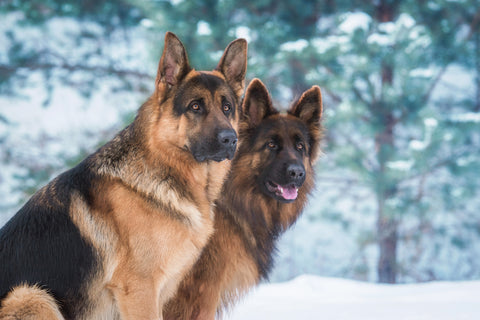
Common Issues: German Shepherd health problems may be few and far between, but they may have genetics giving them a higher risk of certain conditions. GSDs sourced from breeders may have genetic predispositions due to poor breeding practices, therefore adopted canines may be more genetically diverse.
These dogs may experience stomach issues more often than others, particularly a serious condition called Bloat. Involving a sudden swelling of the abdomen, this condition must be evaluated by a veterinarian. For general digestive maintenance, a probiotic supplement can help balance the GI tract and support digestion.
Breeds of all sizes are often predisposed to joint and hip dysplasia, a genetic abnormality involving joint tissue, which can cause discomfort and limit mobility. Consistent care, including monitoring during play, and supplementation with joint-supporting ingredients, can help keep your German Shepherd on the move.
 GSDs are predisposed to Degenerative Myelopathy (DM), a spine disease involving tissue degeneration that can lead to hind leg weakness and paralysis. While DM in German Shepherds is still rare, owners should be aware of signs to look out for. Symptoms include limping, weakness in legs or hips, and instability when standing; all of these concerns must be evaluated by a veterinarian.
GSDs are predisposed to Degenerative Myelopathy (DM), a spine disease involving tissue degeneration that can lead to hind leg weakness and paralysis. While DM in German Shepherds is still rare, owners should be aware of signs to look out for. Symptoms include limping, weakness in legs or hips, and instability when standing; all of these concerns must be evaluated by a veterinarian.
Nutrition: All canines, especially GSDs with higher energy and activity levels, require high-quality sources of protein in their diet, including chicken, pork, and beef. This breed is not genetically predisposed to food sensitivities, but they may be prone to digestive and stomach problems, so their reaction to foods should be monitored. Many dogs may stare down their owners and beg for table scraps, but food intended for humans can cause digestive upset and lead to weight issues for dogs.
Lifespan: 7-13 years
Physical Activity
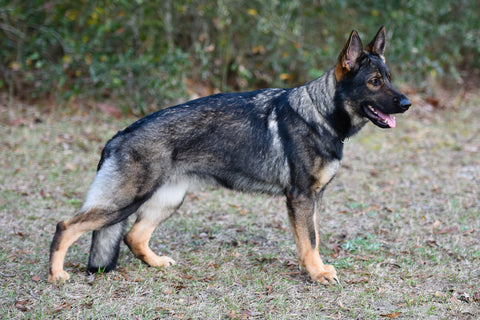 Training: Early training and socialization are crucial to obedience for any dog, especially a highly vigilant German Shepherd. With a tenacious personality, the GSD is a very intelligent companion with potential for service and herding capabilities. German Shepherd puppies ought to be trained as early as possible to help direct their instincts toward helpful, healthy activities. Reward-based training methods tend to work well for most dogs, especially these excitable canines who thrive when rewarded.
Training: Early training and socialization are crucial to obedience for any dog, especially a highly vigilant German Shepherd. With a tenacious personality, the GSD is a very intelligent companion with potential for service and herding capabilities. German Shepherd puppies ought to be trained as early as possible to help direct their instincts toward helpful, healthy activities. Reward-based training methods tend to work well for most dogs, especially these excitable canines who thrive when rewarded.
Exercise: As a highly active and athletic breed, the GSD requires plenty of daily exercise to maintain physical and mental wellness. Any canine who doesn’t get sufficient exercise may exhibit unwanted actions such as destructive behavior, excessive barking, or anxiety. Daily walks, playtime, and engaging toys can help your dog stay active every day.

German Shepherd Dogs are one of the most popular breeds in the US, beloved for their obedient nature and sweet personality. With a GSD in your home or at your side, you’ll be in good company.

